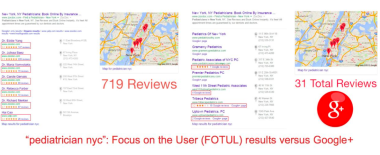Google knowingly manipulates search results according to a research paper published Monday from several academics. The study presents evidence that the search giant sets out to hamper competitors and limit consumers’ options. The paper lands as Google prepares to release its response to the European Union investigation, which rests on similar claims about Google’s comparison-shopping product.
The paper was authored by Tim Wu, the legal scholar and former FTC adviser, which is notable as he had previously penned a column in the New Republic saying that Google had successfully cleared a Federal Trade Commission investigation into search bias on its own merits, and not because of its lobbying prowess.
Now, two years later, Wu is making an about-face.
“When the facts change, your thinking should change,†Wu told Re/code about the evolution of his stance. “The main surprising and shocking realization is that Google is not presenting its best product. In fact, it’s presenting a version of the product that’s degraded and intentionally worse for consumers.â€
He added: “This is the closest I’ve seen Google come to [being] the Microsoft case.â€
For Wu, the facts that changed came from Yelp. The local reviews company — and longstanding Google adversary — built a browser plugin meant to recreate Google’s organic search page stripped of its OneBox, the listings and map pairing Google began inserting in 2009 for searchers that triggers local results. Yelp named the alternative search results “Focus on the User,†after the anti-Google campaign it and other companies like TripAdvisor launched last year to convince EU regulators to move on an antitrust suit.
Yelp From Yelp’s paper “Is Google degrading search?â€
Yelp ran a study testing this search page version against Google’s, surveying 2,690 participants. Users clicked through on the map for its version at a 45 percent higher rate — evidence, the Yelp and Wu paper argues, that Google’s modus operandi in search denies consumers the best results.
“The easy and widely disseminated argument that Google’s universal search always serves users and merchants is demonstrably false,†the paper reads. “Instead, in the largest category of search (local intent-Âbased), Google appears to be strategically deploying universal search in a way that degrades the product so as to slow and exclude challengers to its dominant search paradigm.â€
Yelp compensated Wu for the study, along with his co-author Michael Luca, a Harvard Business School economist. Other companies frequently do the same. “They are paying me for my time,†Wu said. “But I wouldn’t be doing this if I didn’t think this new evidence was a game-changer.â€
Core to the report’s claim is the concern, festering since Google began straying away from its original ten blue links in search, that the Mountain View behemoth favors its own results over others. Google has repeatedly denied this, arguing that its revamped search puts the most relevant results in front of searchers. (Here is chairman Eric Schmidt making the case in Germany last year.)
Although the Yelp study does not disclose its full methodology, its statistical approach looks sound. However, Google may argue that the study’s exclusive focus on clicks is too narrow a metric for consumer preference in local search. Google is, particularly on mobile, trying to reduce clicks in lieu of results that show the answer immediately. Plus, the company’s structured data absorbs several signals in local search, like the accuracy of a business location on a map, that may be absent from Yelp’s plugin. Respondents may have clicked more on Yelp’s map, but that doesn’t mean they arrived at what they were looking for.
FTC Denies Report That Agency Ignored Staff Recommendation on Google
Google declined to comment.
The company is currently mulling a response to the EU’s suit against its shopping product, in which Yelp is a complainant. The EU’s competition commissioner has noted that future antitrust charges could extend to other online Google services adjacent to search, like travel bookings or maps. Last week, Getty Images joined the EU suit, claiming Google is exercising monopoly power in image search.
When the EU probe broke out in April, tech policy analysts said there were little odds it would spur a reignited FTC investigation.
Wu, a renowned scholar on Internet governance (and failed candidate for lieutenant governor of New York), advised the FTC in 2011 and 2012. In his conversation with Re/code, he did not call for an FTC antitrust case, but he stressed that the paper demonstrates possible grounds for one. “I would say that there is criteria for action suggested by evidence of consumer harm,†he said. “The door is open.â€
The FTC declined to comment. Earlier this year, the Wall Street Journal uncovered documents showing that, during the prior investigation, FTC staffers voiced concern that evidence of Google’s search bias was inconclusive, namely around local search and travel. The agency subsequently denied having ignored those staff recommendations.
Article source: http://recode.net/2015/06/29/yelp-teams-with-legal-star-tim-wu-to-trounce-google-in-new-study/


